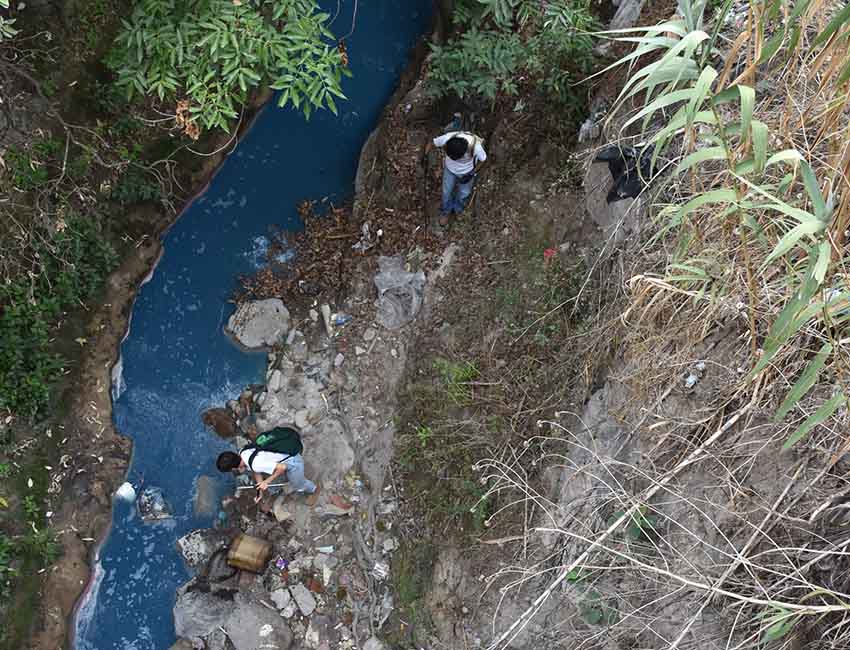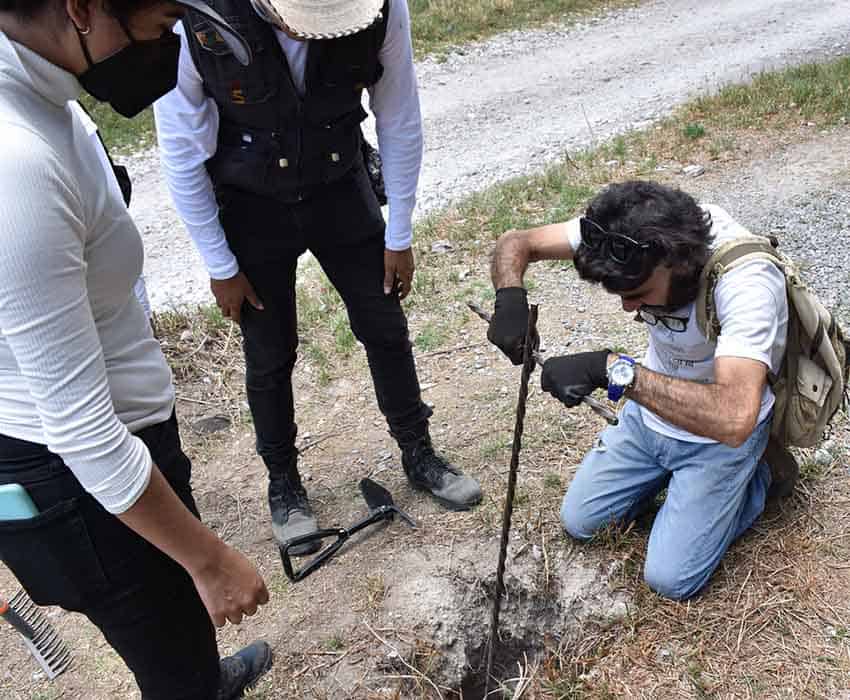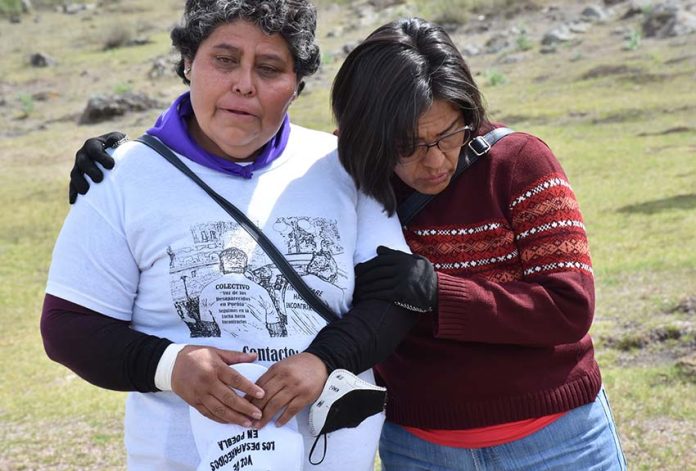When María Luisa Núñez Barojas’ son didn’t return home one night in late April 2017, she became extremely worried. She lives in Tehuiztla, a part of Puebla city that’s so dangerous, people don’t go out at night.
“We imposed curfew,” she said. “After six in the evening, nobody leaves their house and nobody drives on the highways or on the roads because it is very unsafe.”
Her son Juan was with two friends in a Dodge Durango and were still out at 9:30 p.m, already enough reason to make him a possible crime victim where they live.
“I thought that maybe they had been assaulted to steal the truck or that they could have them confused with other young men. My son, he was not a criminal.”

Days later, when the three young men still failed to show up, she realized they had become what Mexicans call los desaparecidos. The disappeared.
She and the families of the other two young men, searched for them. Their search eventually led Núñez to found The Voice of the Disappeared in Puebla Collective, which conducts searches for the desaparecidos.
At first, Nuñez hoped she would find her son alive. “[I thought] maybe they hit him,” she said. “Maybe he lost his memory or was in a coma in some hospital, [or] was in a condition in the street in which he could not return home. I looked for him alive, among the living.”
But Juan’s disappearance haunted her.
“As a mother, when my son disappeared,” she said, her eyes beginning to tear up, “every day I was worried, thinking, ‘Where could he be? How is he? Is he alive? Could he be dead? If he is alive, is he cold? Does he eat or drink water?’
“I could not sleep, thinking that maybe my son was cold, and I could not eat, thinking my son was hungry. It is to die every day. It’s permanent torture, and it wears you down in every way.”
So she continued searching. Because she didn’t know where, or even how to search for Juan, she started looking on social networks like Facebook for information.
“I looked for an organization, an association, someone who could help me — who could orient me, accompany me — who could help me look for my boys in Puebla,” Núñez said.
She didn’t find anything or anyone in Puebla, but she did learn about colectivos (collectives) in other states that searched for desaparecidos. In the beginning, she didn’t see their value.
“I did not find much of a reason to be in a colectivo,” she explained, “because I saw that the they were looking primarily in clandestine graves, and I did not want to think that my son was dead. I saw that colectivos made protest marches. I said, ‘In what way will a protest find someone? I am not going to find my son by marching.’”
Instead, she sought help from her state government’s state search commission, created in 2017 by national law.
After years of intense pressure from families of disappeared persons and others, the Mexican government enacted the General Law on Forced Disappearances and Disappearances of Individuals, which also created the National Search Commission, tasked with finding the missing. There are also search commissions in every state.

The National Search Commission website lists 103,261 disappeared persons in Mexico. In the state of Puebla, there are close to 2,000. Both numbers are almost certainly undercounts.
Many families are afraid that those who took their relatives — gangs, cartels or even police — might come after them, so they don’t report disappearances.
“The whole country is a clandestine grave,” said Voz de los Desparecidos member Marcelo Salvador Salinas Cubillos, “The whole country.” Salinas’ wife and brother-in-law disappeared in Veracruz just over three years ago.
In August 2018, a year after Juan’s disappearance, Nuñez was frustrated with the lack of help given by the state search commission, so she changed her mind about search collectives and started Voz de los Desparacidos. Two or three times a month, the group conducts a búsqueda, or a search, held when someone in the group receives information, sometimes a phone call.
“The information [may not] be true because the call is anonymous,” said Salinas. But sometimes, he said, they learn “…that in a certain place, there is a clandestine grave or that in such a place they throw bodies.”
In November 2020, Nuñez’s worst fears came true: the group found the remains of Juan and his two friends.
“To know… that they tortured him horribly,” she said, “they executed him, they threw him in a grave more than 20 meters deep, it hurts so much.” But, she added, “He is finally safe from so much evil. The torture of not knowing how he is doing is over.”
Despite having found her son, and despite the risks, she continues to organize and go on searches. She’s not afraid, she said. “The only fear I had,” she said, “was that I would die without finding my son.”
Recently, in late June, group members gathered in Puebla’s zócalo: a member had received a phone call that the body of her son, who disappeared in 2018, may have been left in a ravine. They drove to the location, where they met staff from the state search commission, firemen and a contingent of police. The first two groups were there to help with the search; the police were there to provide protection.
Members have received threats Núñez said. Once, when she was searching for her son, “A pickup followed us,” she said. “When we were looking in the hills, on roads, they called me on the phone and told me, ‘Stop looking for your son.’”
On this day in June, members watched as a fireman rappelled into the ravine. The group fanned out. “We look for depressions in the ground,” Salinas explained. “If the grave is fresh, there is usually a mound, but after a rain, the ground sinks a bit.”
He carried a varilla, a thin, pointed metal rod. When the group finds something that could be a grave, he sinks it into the ground, alert for a tell-tale smell.
“Sometimes the odor of a body is released or I can smell it on the tip. It is the smell of a person, of decomposition,” Salinas explained.
Nobody was recovered that day. But the group keeps trying, for themselves and for other members. Although Salinas’ wife and brother-in-law disappeared in Veracruz, he regularly participates in searches with the Puebla colectivo.
“It’s not only me looking for my family,” he said. “We are looking for everyone. So when a member tells us information that my son might be in such a place, well, most of us go to accompany them and to find them.”
In the collective, they have found a family, Salinas said.
“We get along really well,” he said. “[We] share the pain and the same objective: to find the desaparecidos.”
Joseph Sorrentino, a writer, photographer and author of the book San Gregorio Atlapulco: Cosmvisiones and of Stinky Island Tales: Some Stories from an Italian-American Childhood, is a regular contributor to Mexico News Daily.
